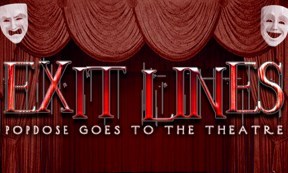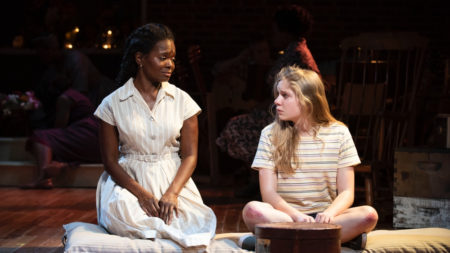 Summer is the time for visiting old friends, and where theater is concerned Audra McDonald and Michael Shannon are two of our besties. But the churn rate afflicting the Broadway season just past is already hitting the one just started, with their 2019-2020 opener, a revival of Terrence McNally’s Frankie & Johnny in the Clair de Lune, soon to close, a month before scheduled. So Frankie (McDonald) and Johnny (Shannon) are leaving before long, and you should trek over to see them at the Broadhurst, where they are in fine form.
Summer is the time for visiting old friends, and where theater is concerned Audra McDonald and Michael Shannon are two of our besties. But the churn rate afflicting the Broadway season just past is already hitting the one just started, with their 2019-2020 opener, a revival of Terrence McNally’s Frankie & Johnny in the Clair de Lune, soon to close, a month before scheduled. So Frankie (McDonald) and Johnny (Shannon) are leaving before long, and you should trek over to see them at the Broadhurst, where they are in fine form.
“Fine form” is what you see at the outset, as the two characters engage in awkward first-time sex. (The actors’ nudity is artfully concealed by ace lighting designer Natasha Katz.) For Frankie, who’s been to this rodeo before, it’ll be the last time, and as soon as the session ends she connives to get him out of her apartment. Johnny, her new co-worker at the diner they toil at, doesn’t seem like much of a catch, and is both mildly duplicitous and overly ingratiating. But as a typical NYC evening circa 1987 slips away and Johnny finds ways to persist (the Channel 5 Movie Club is on the TV, and Debussy’s “Claire de Lune,” a tune they bond over but can’t quite place, is on a requests program on a local classic radio station) Frankie has a change of heart–or would, if she and her one-night stand can find the emotional courage to open up to one another.
Like the same year’s Burn This, this is an age-of-AIDS play that mostly skirts the subject, with the subject of what we today call “hookup culture” in our parlance briefly addressed by this straight couple (who live a bit dangerously). But McNally, whose 80th year this is, has written two characters whose travails are timelessly engaging, and the play is far less of a slog than its Broadway traveling companion. Confined, like Burn This, to a single, shopworn set (yeoman work by Riccardo Hernandez) the play is also restricted to a single night, and doesn’t push unbelievable behavior.
If you only know the play from its 1991 film version (which adds characters), you don’t really know it; its leads, Michelle Pfeiffer and Al Pacino, are two glam to convince as love’s losers. That said, if you saw the Broadway revival of 2002, with Edie Falco and Stanley Tucci, then you saw its definitive playing. McDonald and Shannon are however a happy medium. I don’t quite get him as a sex symbol (as some friends do) but he has a peculiar magnetism, laced with menace, that makes Johnny thoroughly unpredictable; you understand Frankie’s unease. More importantly, once he gets his stories straight and conveys Johnny’s sensitive, wounded nature, he shows what a terrific, multifaceted actor he is.
Audra McDonald–goddess. What is there left to say? That such a person walks among us is proof of the divine. As a performer she has it all, which might overpower a character as insecure as Frankie. But her instincts are sharp; her Frankie is vivid, and she makes her tragic backstory bracingly real. Having Arin Arbus, a woman director, at the helm is an absolute asset; there’s a shaping of both actors that feels different (more intuitive, less broad) than had a male director been engaged. (Also aboard is Claire Warden, who has the somewhat amusing title of Intimacy and Fight Director, but it’s no joke; the choreography of each is thoughtfully attuned.) We come naturally to these two artists; in turn, they bring Frankie & Johnny in the Claire de Lune close to us. See it soon, and revel in their artistry.
 Summer theater in NYC is often like January-February at the movies, where the weaker deer go to die, out of sight. Long Lost, a perfunctory family melodrama by the appreciably better-than-this Donald Margulies, was one case in point. A musical of the bestselling The Secret Life of Bees had everything going for it to beat the heat: book by two-time Pulitzer winner Lynn Nottage (Ruined, Sweat), music by Duncan Sheik (Spring Awakening), lyrics by Susan Birkenhead (Working), direction by Sam Gold (Fun Home). But this hive of talent yields little honey.
Summer theater in NYC is often like January-February at the movies, where the weaker deer go to die, out of sight. Long Lost, a perfunctory family melodrama by the appreciably better-than-this Donald Margulies, was one case in point. A musical of the bestselling The Secret Life of Bees had everything going for it to beat the heat: book by two-time Pulitzer winner Lynn Nottage (Ruined, Sweat), music by Duncan Sheik (Spring Awakening), lyrics by Susan Birkenhead (Working), direction by Sam Gold (Fun Home). But this hive of talent yields little honey.
Maybe it’s the source, one of those white-people-redeemed-by-black-suffering doorstops that play differently than intended in our race-riven age. Nottage can’t do much more than transpose its clotted malarkey into inspirational feel-good text, making for a rather grueling experience is you can’t get on board. In short: it’s South Carolina in 1964, and Lily (Elizabeth Teeter), a teen who has been made to feel that she offed her mother, flees her abusive dad. She finds some comfort amidst a family of black beekeepers, with a special affinity for August (LaChanze). But it’s South Carolina in 1964, and the idyll can’t last, not with Lily being attracted to Zachary (Brett Gray), an upstanding black youth who works at the apiary, and not even with a black Madonna statue giving comfort to all these blessed folks. It’s that kind of book (I made it through part of it) and that kind of musical; the 2008 film version at least had bees, whose presence is aurally suggested.
LaChanze has the kind of voice that fills the room, and she blasted through the original, overdone production of The Color Purple to win a Tony. But August is a recessive, reactive character, spectating Lily’s problems and dropping in exposition, and the treacly melodramatics are unleavened by much humor. (Another talented musical performer, Manoel Felciano, has little to do except glower as Lily’s mean father.) As played by the small onstage band the songs aren’t bad, but when you’re not clicking with the material they don’t really stick out. (“River of Melting Sun” establishes a somber tone at the beginning, and the penultimate “Marry Me” is a rousing piece that comes too late for a charm song.) Maybe I was expecting too much from a summer show, but The Secret Life of Bees could use more…sting.





Comments